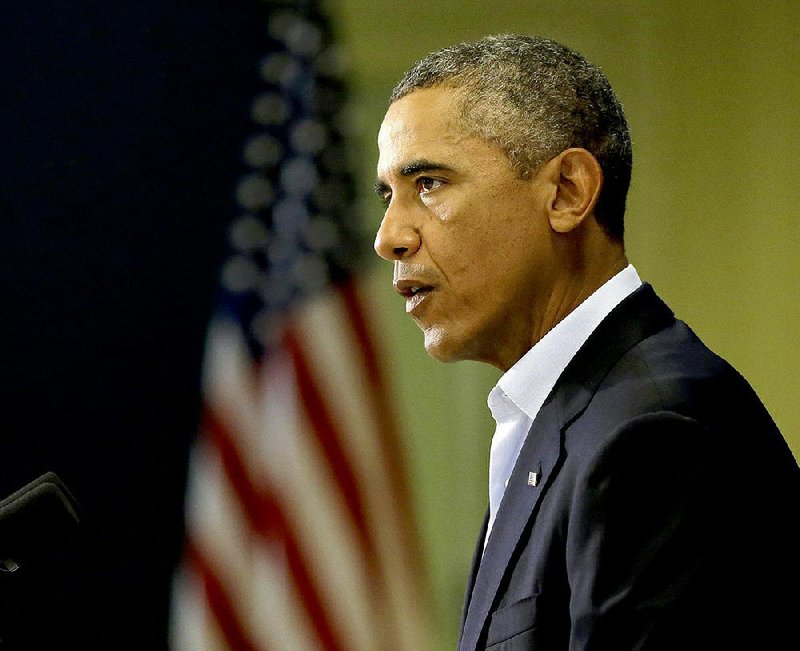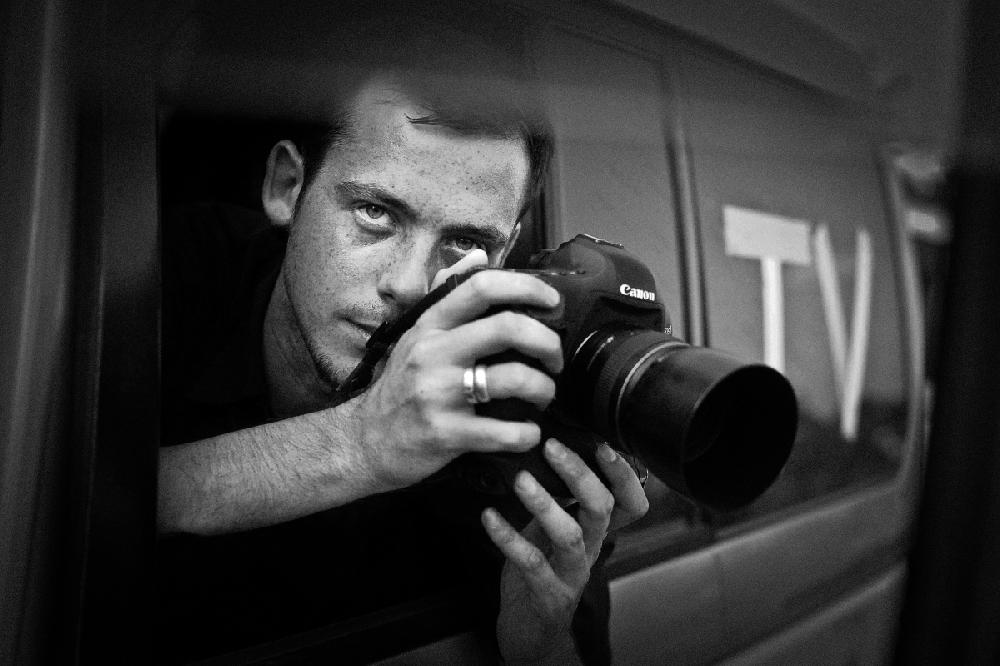WASHINGTON -- The United States stood firm Wednesday in its fight against Islamic State militants, launching a new series of airstrikes against the extremist group that has seized a swath of territory across Iraq and Syria and beheaded a U.S. journalist, despite its threats to kill another American hostage.
RELATED ARTICLES
http://www.arkansas…">Slain journalist rememberedhttp://www.arkansas…">Besieged Iraqi Turkmen town begs for military help
As President Barack Obama vowed relentless pursuit of the terrorists, the White House revealed Wednesday that the U.S. had launched a secret rescue mission inside Syria earlier this summer that failed to rescue James Foley and other Americans still being held hostage.
The president called the Islamic State group a "cancer" in the region and accused them of having "rampaged across cities and villages, killing unarmed civilians in cowardly acts of violence." He said it had committed torture and rape against innocent women and children and continued to enslave those its members did not kill.
"No faith teaches people to massacre innocents," Obama said. "No just God would stand for what they did yesterday and what they do every single day. People like this ultimately fail. They fail because the future is won by people who build and not destroy."
Obama spoke after U.S. intelligence agencies on Wednesday verified the authenticity of a video released by the extremists that shows a masked man decapitating Foley, who was kidnapped in Syria in 2012.
FBI Director James Comey said Wednesday that the FBI has been investigating American hostages in Syria for two years but "these savages have turned that into a homicide investigation."
Foley's mother said she is praying for other hostages being held by the Sunni-dominated terror group, and described her son's slaying as "just evil."
The Islamic State militants have promised to eliminate all people they consider heretics in their quest to enforce their strict interpretation of Islamic law in the state they have declared in territories they control in Iraq and Syria.
"We will be vigilant and we will be relentless," Obama said, urging unity among Mideast governments in order to eviscerate the group's growing power.
Obama said the U.S. would "do what we must to protect our people," but he stopped short of promising to follow the Islamic State to its safe haven within Syria, where officials said Foley had been killed. Later, though, the administration revealed that several dozen special operations troops had been on the ground in Syria briefly in an effort to rescue the hostages but did not find them.
The State Department refused to rule out future U.S. military operations in Syria, where Obama has long resisted intervening in a three-year civil war.
European nations on Wednesday agreed to speed help to fight the militants -- most notably Germany, which bucked public opposition by announcing it would arm Iraqi Kurdish fighters to battle the Islamic State. French Foreign Minister Laurent Fabius said he was outraged by the beheading, deeming it evidence of a "caliphate of barbarism." Italy's defense minister said the country hopes to contribute machine guns, ammunition and anti-tank rockets.
Prime Minister David Cameron of Britain broke off a vacation after the release of the video, in which the killer "appears to be a British person," said British Foreign Minister Philip Hammond.
British officials estimate 500 or more Britons are fighting with the Islamic State, though some have returned home.
Cameron has said Britain will send military support to forces fighting the Islamic State group but not ground troops. He warned that not acting could allow the "terrorist movement" to "target us on the streets of Britain."
The Islamic State called Foley's death a revenge killing for U.S. airstrikes against militants in Iraq and said other hostages would be slain if the attacks continued. Undeterred, the U.S. conducted 14 additional strikes after a video of the beheading surfaced, raising to 84 the number of airstrikes since they began Aug. 8.
Two U.S. officials said additional American troops -- probably fewer than 300 -- could be headed to Iraq to provide extra security around Baghdad, where the U.S. Embassy is located.
That would raise the total number of American forces in Iraq to well over 1,000, although officials said no final decision had been made. The officials spoke on condition of anonymity because they were not authorized to discuss the matter by name.
Mideast reaction
In capitals across the Middle East, news of Foley's death was met largely with silence, even in Syria and Iraq -- the two countries where the Islamic State is strongest.
On social media, people in the region condemned Foley's killing but stressed that the Islamic State has been committing atrocities against Iraqis and Syrians for years.
For much of the past year, and until this summer, the Obama administration was deeply divided on how much of a threat the Islamic State posed to Americans or even other nations beyond Iraq and Syria. Since the militants' march across northern Iraq in June, and as its ranks swelled almost threefold to an estimated 15,000 fighters, Obama has acknowledged that the Islamic State could become a direct threat to Americans.
Foley's death proved to the West what many people in Syria and Iraq already knew: The Islamic State "has declared war on the civilized world," said Dr. Najib Ghadibian, the Syrian National Coalition's special representative to the U.S.
The Islamic State's sweep also has served as a wake-up call to other Mideast governments, said Fawaz Gerges, director of the Middle East Center at the London School of Economics.
"The Saudis, the Kuwaitis, the Emiratis and even the Qataris are getting the message now," Gerges said. "I think in the last few weeks we have seen a kind of new awareness on the part of regional powers that the Islamic State does present a threat to the very social fabric and the foundation of the state system."
Jordan and Saudi Arabia, both of which share a border with Iraq, have dispatched troops to the frontier in a bid to prevent any attempt by the extremists to attack. Iran, an ally of the Shiite-led government in Baghdad, has sent military advisers to help organize Shiite militias in Iraq and defend holy sites.
Foley was one of at least four Americans still being held in Syria -- three of whom officials said were kidnapped by the Islamic State. The fourth, freelance journalist Austin Tice, disappeared in Syria in August 2012 and is believed to be in the custody of government forces in Syria.
The Islamic State video of Foley's beheading also showed another of the missing American journalists, Steven Sotloff, and warned he would be the next killed if U.S. airstrikes continued. U.S. officials believe that the video was made days before its Tuesday release, perhaps last weekend, and they have grown increasingly worried about Sotloff's fate.
The New York-based Committee to Protect Journalists says that more than 80 journalists have been abducted in Syria, and estimates that around 20 are currently missing there. It has not released their nationalities.
In its annual report in November, the committee described the widespread seizure of journalists as unprecedented and largely unreported by news organizations in the hope that keeping the kidnappings out of public view may help in the captives' release.
Obama avoided specific mention of the other American hostages in Syria and was vague on whether the U.S. would significantly ramp up its assault on the Islamic State beyond the airstrikes and the small potential increase in troops in Iraq.
A senior U.S. official said the administration was well aware of the risks to the hostages once the strikes began, and would now consider as aggressive a policy as possible to obliterate the militants.
The other U.S. officials said the secret mission to rescue the U.S. hostages involved several dozen special operations forces dropped by aircraft into Syria. The hostages weren't found, but the forces engaged in a firefight with Islamic State militants before departing. Several militants were killed, and one American sustained minor injuries, the officials said.
"The U.S. government had what we believed was sufficient intelligence, and when the opportunity presented itself, the president authorized the Department of Defense to move aggressively to recover our citizens," Lisa Monaco, Obama's top counterterrorism adviser, said in a statement. "Unfortunately, that mission was ultimately not successful because the hostages were not present."
At the State Department, spokesman Marie Harf did not rule out military operations in Syria to bring those responsible for Foley's death to justice, saying the U.S. "reserves the right to hold people accountable when they harm Americans."
Some U.S. lawmakers, however, said they doubted the White House would expand its attacks to strike within Syria -- something the Obama administration has long resisted.
"The mission already crept a bit," said Rep. Adam Schiff, a California Democrat and House Intelligence Committee member. "The administration would be wise to not get sucked in. That's going to be very hard."
Meanwhile, Republican lawmakers who have been pressing for a more aggressive U.S. response against the Islamic State group seized on the beheading as evidence that Obama had not done enough to confront the militants and to acknowledge them as a direct threat to Americans.
"I remain deeply concerned that despite the preponderance of evidence that proves [the Islamic State] is a fundamentally evil and dangerous terrorist threat to the United States, President Obama continues to appear unwilling to do what is necessary to confront" the group, Sen. Marco Rubio, R-Fla., said in a statement after the video's release.
Information for this article was contributed by Lara Jakes, Ryan Lucas, Lolita C. Baldor, Bradley Klapper, Josh Lederman, Jim Kuhnhenn, Rik Stevens, Zeina Karam and staff members of The Associated Press and by Michael D. Shear, Julie Hirschfeld Davis, Rukmini Callimachi, Steven Erlanger, Alan Cowell, Kimiko de Freytas-Tamura, Alison Smale and Helene Cooper of The New York Times.
A Section on 08/21/2014
26536614



